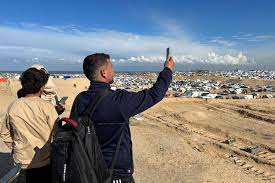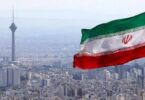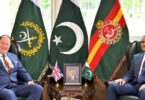GAZA STRIP (Reuters): Hamzeh Tabash walks to the Egyptian border every day from his tent in Gaza for a faltering mobile signal so he can send voice messages to loved ones separated by war and hopefully receive one in return.
“One message revives the soul,” he says.
Most of bombed-out Gaza’s 2.3 million people have fled their homes under Israel’s intense bombardment and ground assault, scattered into tent cities where their only news of those they care about most depends on a broken phone network.
With the local telecom network almost entirely out of operation, especially in the north and center of the Palestinian enclave, many people try to connect to the Egyptian network by standing along the border.
“Mother, how are you? I hope you’re well. Things are fine here. I wanted to reassure you. Don’t worry,” Tabash said, recording a short voice note and holding his phone into the air to try to transmit it.
The family are from Khan Younis but they split when Israel began to focus its offensive on the city, the biggest in the enclave, with Tabash heading for Rafah and his mother staying at the family home.
Fighting and destruction in Khan Younis has been intense in recent days and those with family still there are terrified for their safety.
Where Tabash stood on a high point by the first barbed wire border fence with Egypt, a cluster of other people were sitting on the sand tapping in messages, pacing in circles as they talked or holding their phones into the air trying for a signal.
Gaza’s phone network, run by the local provider Paltel, has reported more than 10 total collapses in service provision since Oct. 7.
Sitting by border fence, anxiety written across her face, Mariam Odeh said she too had been separated from parts of her family who stayed in Khan Younis.
“We want to communicate with our relatives, reassure them and tell them we are still alive. Every day we come to the Egyptian border to call our relatives because when they call there is no service, even in Rafah. When they call us they can’t connect,” she said.







